Here’s one former NDP voter who remains sceptical about returning to the fold, for the time being at least
Jun 20th, 2011 | By Citizen X | Category: In Brief
Jack Layton s'adressant aux délégués réunis à Vancouver. Photo : La Presse canadienne (photo) Darryl Dyck.
According to back-of-the-envelope calculations I have just made, I cast my first democratic ballot in the Ontario provincial election of October 17, 1967. I did not know where my local polling station was, but I did know the NDP candidate’s campaign office. I went there to ask where to go to lose my electoral virginity on behalf of the Ontario New Democrats.
In the end (to quote from the Wikipedia article on “Ontario general election, 1967”), the “Progressive Conservative Party, led by John Robarts, won an eighth consecutive term in office, and maintained its majority in the legislature despite losing eight seats from its result in the previous election.” Nonetheless the “social democratic Ontario New Democratic Party, led by Donald C. MacDonald, increased its caucus in the legislature from 7 members to 20.”
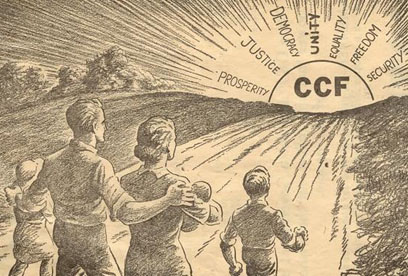
“Towards the Dawn!” – election visual for Saskatchewan's provincial Cooperative Commonwealth Federation (CCF) in the 1930s.
Buoyed by this dramatic improvement in Ontario NDP fortunes, on June 25, 1968 I voted for the New Democrats in the Canadian federal election that first put Pierre Trudeau in the prime minister’s office. At this point the NDP was not quite seven years old. It was still led federally by Tommy Douglas, who had earlier pioneered the modern Canadian federal-provincial health care system, as the CCF Premier of Saskatchewan.
I continued to vote NDP, federally and provincially, during the first phase of my career as an active Canadian citizen of the late 20th and early 21st centuries. At this distance I cannot exactly remember when I first switched to the Liberals. It may have been in the federal election on February 18, 1980, because it seemed that Pierre Trudeau would make the best prime minister in Ottawa for the Quebec sovereignty referendum on May 20, 1980.
I nowadays do entertain a considerably higher opinion of Pierre Trudeau (who had NDP associations himself, before he became a Liberal MP) than I did for at least most of his actual time in office. I would agree with the current assessment that “he was and remains the altogether most interesting prime minister of Canada to date, without the slightest prospect of competition.”
My recollection, however, is that I did not suddenly switch from always voting NDP to always voting Liberal. For some time I still sometimes voted NDP, while voting Liberal other times, in response to my perceptions of specific circumstances. It may be that the last time I voted NDP was in the Ontario provincial election of September 6, 1990.
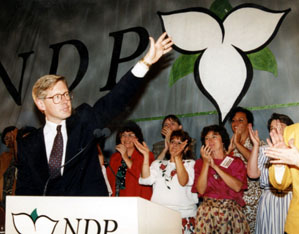
Bob Rae, Ontario NDP Leader, just before his surprising election as Premier, September 1990. Photo: Toronto Star.
If this is true, it was not because I subsequently felt Bob Rae had done such an unsatisfactory job as the province’s first NDP premier. I finally stopped voting NDP altogether at least partly because it seemed Bob Rae’s party (at that time, and in Ontario at any rate) was not at all as seriously prepared as its leader to take on the real challenges and responsibilities of governing.
My drift from the NDP to the Liberals also took place, however, because I gradually got to know a few very active New Democrats, federally and provincially. And it seemed that I did not quite share their values, or they did note quite share mine. (And, as best as I could tell, it was they who wanted to exclude me, not the other way around.)
* * * *
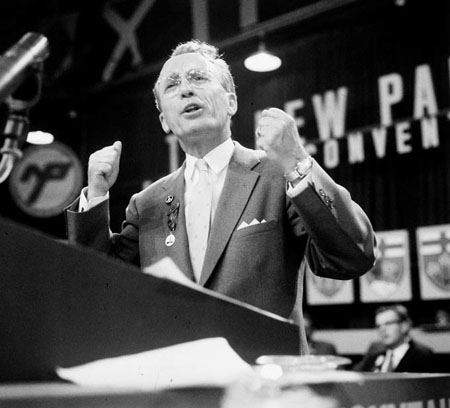
Tommy Douglas at the founding convention of the New Democratic Party (NDP – aka just the New Party or "NP" at the time) in Canada's capital city of Ottawa, July 31—August 4, 1961.
Inevitably, the Canadian federal election of May 2, 2011 has made me think about the prospect of starting to reassess my drift away from the New Democrats over the past few decades.
I have been encouraged by such headlines from the federal NDP convention in Vancouver this past weekend as “Why the NDP shouldn’t shut the door on the Liberals” ; “NDP keeps door open for merger talks with Liberals” ; “NDP membership won’t ban merger talks with Liberals” ; and “Les néodémocrates laissent la porte ouverte à une fusion avec les libéraux.”
At the same time, I am not surprised when I also read that : “A resolution calling for rejection of any merger talk was batted down by delegates at the party’s convention on Sunday morning.” But the “proposal” nonetheless “tapped a bitter vein … and support was so close the party had to hold a standing vote … ‘We don’t need these so-called friends,” said one delegate. “Now they want us to become the Liberal party. . . (and) abandon the socialist principles we stand” for… The “defeated resolution said the NDP should ‘reject any proposals to merge with the Liberal party.’ Instead, the NDP should ‘extend a warm welcome to all former Liberal supporters who wish to join the genuine anti-Conservative opposition – the NDP.’”
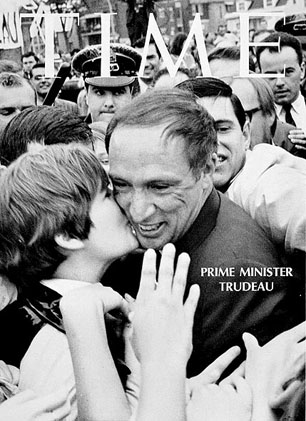
Prime Minister Trudeau, on the cover of Time (Canada) Magazine, July 5, 1968 Photo: Duncan Cameron, Library and Archives Canada C-027281.
Or, similarly: “Trevor Zimmerman …Â said he put forward the motion [to ‘reject any proposals to merge with the Liberal party’] because he wanted the party’s grassroots to send a clear direction to the NDP’s leadership to rule out any such ideas … ‘We need to be clear that we do not need the Liberals,’ he said … Socialist parties around the world form government, Zimmerman added. ‘It happens, and it’s about time it happened in Canada, on our own terms,’ he said.”
I wonder what it means as well when a NDP delegate at the convention called Peter Thurley says: “There are a large number of delegates who don’t want to become the next Liberal Party of Canada … At the same time, we have to figure out how we’ll be able to speak to and connect with average everyday Canadians in a language that they understand, in a language that they know and resonate with.”
All these voices, in their own sometimes somewhat different ways, still sound quite a lot like the voices which finally persuaded me to stop voting New Democrat altogether – at some now exactly forgotten exact point a few decades ago, more or less. They do not want people who do not share their own exact opinions on a great wealth of subjects, from alpha to omega. And I still have a feeling that they do not want people like me (who are nonetheless, as I see things myself, quite progressive, in many different senses of the word).
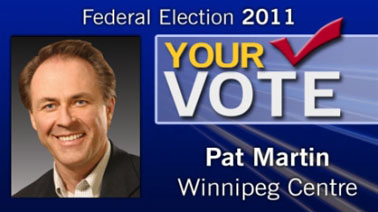
Pat Martin, who doesn’t even have the name “New Democratic Party” on this particular graphic, believes references to “socialism” in the party’s current constitution are “holding us back ... All we have to do is a few simple things to change the language so we don’t scare people.”
I will never vote Conservative. Of that I am dead certain. And I am encouraged to hear that Jack Layton and veteran NDP MPs like Pat Martin are not profoundly and unalterably wedded to such “adjectives” as “socialist.”
(Not that I think there is anything at all wrong with the word “socialist,” I hasten to add. It is just, I would respectfully submit, that while the progressive movement I support myself in 2011 certainly includes people who call themselves socialists, it is not confined to them. And/or passing some socialist or any other ideological or philosophical or quasi-religious litmus test, as defined by some political bureaucracy, is not a requirement for supporting any progressive political party I want to vote and, in one degree or another, even work for.)
Yet, for the time being, I remain far from comfortably convinced that even Jack Layton’s and Pat Martin’s New Democratic Party of Canada can become something over the next four years that a person like me might seriously consider voting for once again. I don’t think Bob Rae should turn in his new Liberal union card just yet.
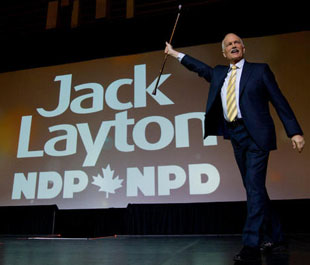
NDP Leader Jack Layton raises his cane as he takes to the stage to deliver his keynote speech at the party's 50th anniversary convention in Vancouver, on Sunday June 19, 2011. DARRYL DYCK/THE CANADIAN PRESS.
It may be that, for good enough reasons, neither party wants to “merge” with the other in any immediate future. But it still seems to me that the only workable progressive governing prospect in Canadian federal politics over the next number of years is almost certainly going to have to involve some kind of new and forward-looking co-operation between current New Democrats and current Liberals.
I’m not sympathetic myself to members of either party who reject any detente of this sort out of hand. And, as best as I can make out, the activist cores of both parties are still far too divided on this issue.
The only entirely good news at the moment is that the “42nd Canadian federal election … tentatively scheduled for October 19, 2015” is still far away.
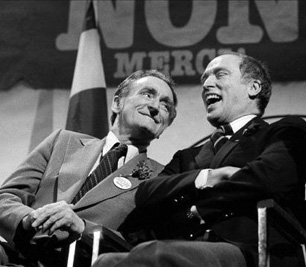


There is a great story about problems with the Ontario NDP crushing any opinions not is complete agreement with Howarth’s office
http://www.thestar.com/news/canada/politics/article/1011271–cohn-ontario-ndp-preens-for-power-and-prorogues-dissenters
and information on some well respected long time NDP members at http://www.thegingerproject.org